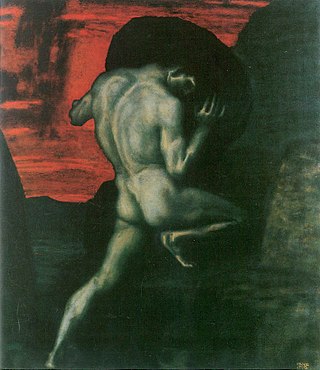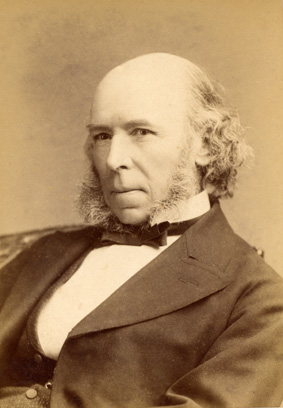
A concept is an abstract idea that serves as a foundation for more concrete principles, thoughts, and beliefs. Concepts play an important role in all aspects of cognition. As such, concepts are studied within such disciplines as linguistics, psychology, and philosophy, and these disciplines are interested in the logical and psychological structure of concepts, and how they are put together to form thoughts and sentences. The study of concepts has served as an important flagship of an emerging interdisciplinary approach, cognitive science.

A metaphor is a figure of speech that, for rhetorical effect, directly refers to one thing by mentioning another. It may provide clarity or identify hidden similarities between two different ideas. Metaphors are usually meant to create a likeness or an analogy.
Non-cognitivism is the meta-ethical view that ethical sentences do not express propositions and thus cannot be true or false. A noncognitivist denies the cognitivist claim that "moral judgments are capable of being objectively true, because they describe some feature of the world." If moral statements cannot be true, and if one cannot know something that is not true, noncognitivism implies that moral knowledge is impossible.
Philosophical analysis is any of various techniques, typically used by philosophers in the analytic tradition, in order to "break down" philosophical issues. Arguably the most prominent of these techniques is the analysis of concepts, known as conceptual analysis.
In cognitive linguistics, conceptual metaphor, or cognitive metaphor, refers to the understanding of one idea, or conceptual domain, in terms of another. An example of this is the understanding of quantity in terms of directionality or the understanding of time in terms of money.

A figure of speech or rhetorical figure is a word or phrase that intentionally deviates from straightforward language use or literal meaning to produce a rhetorical or intensified effect. In the distinction between literal and figurative language, figures of speech constitute the latter. Figures of speech are traditionally classified into schemes, which vary the ordinary sequence of words, and tropes, where words carry a meaning other than what they ordinarily signify.
A cliché is a saying, idea, or element of an artistic work that has become overused to the point of losing its original meaning, novelty, or figurative or artistic power, even to the point of now being bland or uninteresting. In phraseology, the term has taken on a more technical meaning, referring to an expression imposed by conventionalized linguistic usage.

Absurdism is the philosophical theory that the universe is irrational and meaningless. It states that trying to find meaning leads people into conflict with a seemingly meaningless world. This conflict can be between rational man and an irrational universe, between intention and outcome, or between subjective assessment and objective worth, but the precise definition of the term is disputed. Absurdism claims that, due to one or more of these conflicts, existence as a whole is absurd. It differs in this regard from the less global thesis that some particular situations, persons, or phases in life are absurd.

Subjective idealism, or empirical idealism or immaterialism, is a form of philosophical monism that holds that only minds and mental contents exist. It entails and is generally identified or associated with immaterialism, the doctrine that material things do not exist. Subjective idealism rejects dualism, neutral monism, and materialism; it is the contrary of eliminative materialism, the doctrine that all or some classes of mental phenomena do not exist, but are sheer illusions.
A thought-terminating cliché is a form of loaded language, often passing as folk wisdom, intended to end an argument and quell cognitive dissonance. Its function is to stop an argument from proceeding further, ending the debate with a cliché rather than a point. Some such clichés are not inherently terminating. They only become so when used to intentionally dismiss dissent or justify fallacious logic.
Nonsense is a form of communication, via speech, writing, or any other symbolic system, that lacks any coherent meaning. In ordinary usage, nonsense is sometimes synonymous with absurdity or the ridiculous. Many poets, novelists and songwriters have used nonsense in their works, often creating entire works using it for reasons ranging from pure comic amusement or satire, to illustrating a point about language or reasoning. In the philosophy of language and philosophy of science, nonsense is distinguished from sense or meaningfulness, and attempts have been made to come up with a coherent and consistent method of distinguishing sense from nonsense. It is also an important field of study in cryptography regarding separating a signal from noise.
A truism is a claim that is so obvious or self-evident as to be hardly worth mentioning, except as a reminder or as a rhetorical or literary device, and is the opposite of falsism.
In rhetoric, a glittering generality or glowing generality is an emotionally appealing phrase so closely associated with highly-valued concepts and beliefs that it carries conviction without supporting information or reason. Such highly valued concepts attract general approval and acclaim. Their appeal is to emotions such as love of country and home, and desire for peace, freedom, glory, and honor. They ask for approval without examination of the reason. They are typically used in propaganda posters/advertisements and used by propagandists and politicians.

"Survival of the fittest" is a phrase that originated from Darwinian evolutionary theory as a way of describing the mechanism of natural selection. The biological concept of fitness is defined as reproductive success. In Darwinian terms, the phrase is best understood as "survival of the form that in successive generations will leave most copies of itself."
A saying is any concise expression that is especially memorable because of its meaning or style. A saying often shows a wisdom or cultural standard, having different meanings than just the words themselves. Sayings are categorized as follows:
In philosophy—more specifically, in its sub-fields semantics, semiotics, philosophy of language, metaphysics, and metasemantics—meaning "is a relationship between two sorts of things: signs and the kinds of things they intend, express, or signify".
A tautophrase is a phrase or sentence that tautologically defines a term by repeating that term. The word was coined in 2006 by William Safire in The New York Times.

Thought Reform and the Psychology of Totalism: A Study of "Brainwashing" in China is a non-fiction book by psychiatrist Robert Jay Lifton on the psychology of brainwashing.

Cartesian doubt is a form of methodological skepticism associated with the writings and methodology of René Descartes. Cartesian doubt is also known as Cartesian skepticism, methodic doubt, methodological skepticism, universal doubt, systematic doubt, or hyperbolic doubt.
In literary criticism and rhetoric, a tautology is a statement that repeats an idea using near-synonymous morphemes, words or phrases, effectively "saying the same thing twice". Tautology and pleonasm are not consistently differentiated in literature. Like pleonasm, tautology is often considered a fault of style when unintentional. Intentional repetition may emphasize a thought or help the listener or reader understand a point. Sometimes logical tautologies like "Boys will be boys" are conflated with language tautologies, but a language tautology is not inherently true, while a logical tautology always is.







